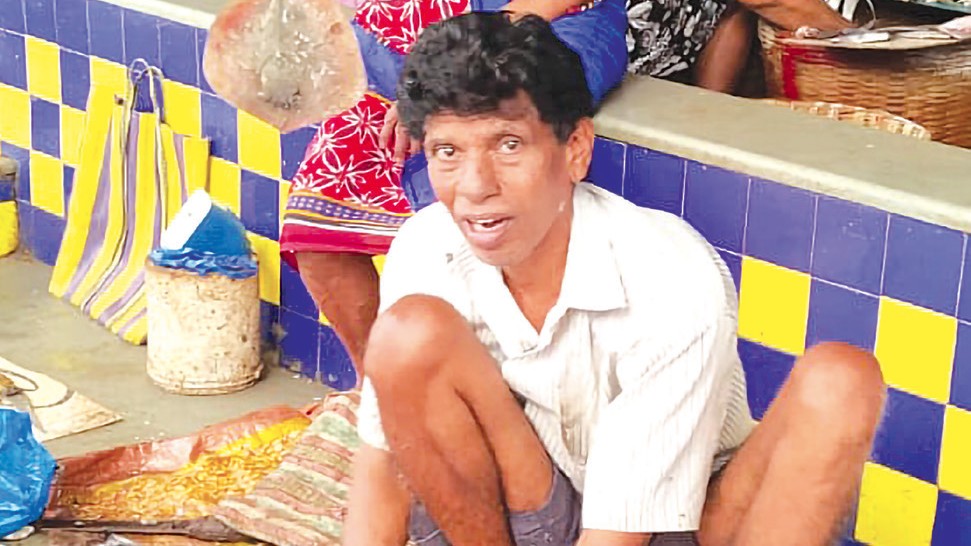

MARIA JOSEPHINE PEREIRA
CALANGUTE: In the bustling fish market in Calangute, one figure stands out—not just for his skill but for the warmth and laughter he brings to his work and his customers’ day. Francisco Luciana Pereira, better known as Abhie, is the last and only Goan fish cutter in the market. For over 24 years, he has been the go-to man for locals and tourists alike, expertly cleaning and cutting fish with the precision of a craftsman and the heart of a true Goan.
A line forms early each morning at his modest workstation, where he greets customers with a cheerful “Bai” or “Baba,” his ever-present smile lighting up the space. “I start my day at 8 am, but even before that, my customers are already waiting. They trust me with their fish, and I take pride in what I do,” he says, deftly slicing through a Marlene as he speaks. He gives you tidbits of information was he works – “This is the most expensive fish in the market, locally known as Todaso. Only Goans know about the taste of this fish, and will fall head over heels to buy it,” he laughs.
Born in 1955, Abhie’s journey has been anything but easy – fact belied by his ever-smiling face. Growing up in the 1960s, long before Calangute became a tourist hub, he lived in a simple mud house with his seven siblings. “My family lived off the land,” he recalls. His father was a toddy tapper and coconut plucker, while his mother, Mariaton, sold their modest produce in the market. “We were poor, but we never went hungry thanks to kind neighbours and the barter system,” he recalls.
Life revolved around nature’s bounty. “We fished in lakes, pulled in nets with the fishermen, and raised pigs and chickens,” he says. His older brother was a pork butcher, and young Abhie would accompany him, traveling across Bardez to catch pigs. “We’d bring them back on our shoulders, tied up and balancing precariously on our cycles,” he laughs, his infectious humour shining through even in the toughest memories.
Calangute of the past was a vastly different world, a sleepy fishing village where the land and sea provided everything. “Back then, there were no hotels, no crowds, just simple homes and hardworking people. We grew our own rice, vegetables, and fruits. Meat was a luxury—we ate what we could catch or hunt,” he reminisces.
He vividly recalls fishing in the many lakes and fields, a time when children didn’t have toys but found joy in nature. “We would wait at the ponds early in the morning when the fish surfaced for oxygen, and with a bow and arrow, we’d catch them. Later, when we grew up, we got an airgun. We’d fill entire sacks with fish, struggling to bring them back on our cycles. Some we’d eat fresh, some we’d pickle, and the rest we’d dry for the monsoon,” he says, a twinkle in his eye.
They made the most of every resource available, using fish manure and pig droppings to fertilise their crops. “Everything was sustainable; we didn’t use chemicals. We took only what we needed from the land
and the sea.” He remembers walking barefoot to the beach, helping the fishermen pull in their nets, in return for a small share of the catch.
His childhood also had moments of adventure. His best friend, Brigido, a footballer and sharpshooter from Siolim, would join him on fishing trips. “We would shoot fish and crabs, explore the fields and forests for wild fruits. Life was simple, but we were never bored,” he recalls.
The turning point for the family came when his sister, Calorina, secured work in Bahrain as a maid. Her earnings changed their fortunes, allowing her to help her siblings find work abroad. In 1971, at just 16, Abhie left for Mumbai, working as a denter and welder. By 1982, he moved to Bahrain, continuing in the same profession for 17 years.
Yet, in 2000, he returned to Goa, longing for a simpler life. “I decided to go back to my roots,” he says. Setting up his fish-cutting stall in Calangute, he became an indispensable part of the community. “People wait for me. They don’t trust anyone else with their fish,” he says with pride.
He is happily married to Fatima Pereira, who assists him in the business, alongside another helper. “Without her, I couldn’t do this alone,” he admits. In a rapidly changing Goa, where traditional occupations are fading, Abhie remains an odd duck. “I don’t want
to stop working. I love what I do,” he says
simply.
A master of many skills
Apart from being a welder, painter, farmer and a fish cutter, Abhie possesses another rare talent—he is a skilled masseuse known for his delicate, healing touch. “People come to me with sprained necks and twisted ankles,” he says, his hands, so adept with a knife, just as skilled in easing pain.
Music is another passion. He plays the traditional Goan percussion instrument, the ‘Ghumot,’ often bringing out his humorous side in song. “Abhie’s laughter is as famous as his fish-cutting skills,” chuckles a long-time customer.